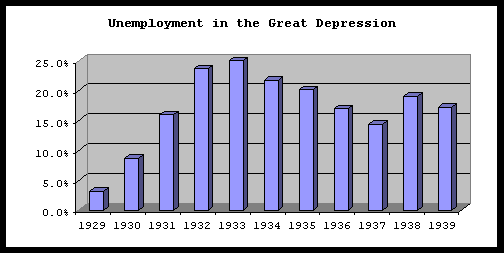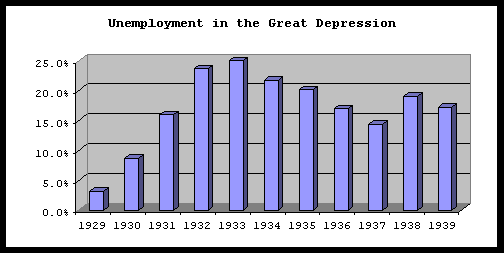- Thread starter
- #301
It roared alright, until the house of cards that created it came to a crashing halt, literally: Causes of the Great DepressionIn case you didn't notice, after GOP presidencies of the 1920's, they never were able to gain the White House for a generation...Because of how they handled the economy...And so we travel on down the road of "Great Lies That Liberal Dunces Continue to Believe."
The way "they handled the economy..." was known as the 'Roaring Twenties."
And, of course, Republican President Harding was far superior to Democrat Roosevelt in fighting recessions.
The Roaring Twenties were the period of sustained economic prosperity with a distinctive cultural edge in New York, Montreal, Chicago, Detroit, Paris, Berlin, London, Los Angeles, and many other major cities during the 1920s in the United States, Canada and Europe.
Roaring Twenties - Wikipedia, the free encyclopedia
Wikipedia, the free encyclopediaRoaring_Twenties
Must I teach you obvious things like this each and every day???????
The causes that catapulted the recession into the 'Great Depression' were
1. The actions of the federal reserve
2. The sky-high Smoot-Hawley Tariff
3. The actions of Hoover that were continued by
Roosevelt
4. And, mainly, the abject ineptitude of Roosevelt.
a. In 1935, the Brookings Institution (left-leaning) delivered a 900-page report on the New Deal and the National Recovery Administration, concluding that “ on the whole it retarded recovery.”
article - AEI
I'd be happy to provide a list of the lies of Roosevelt that magnified and advanced the problems....
...say the word.
I'm SHOCKED, AEI who has tried for decades to rewrite the GOP great depression, misstates the Brooking report?
Hint they said THE National Recovery Admin, NOT the NEW DEAL, "on the whole it retarded recovery."
WHY HOWEVER?
The National Recovery Administration was a prime New Deal agency established by U.S. president Franklin Roosevelt (FDR) in 1933. The goal was to eliminate "cut-throat competition" by bringing industry, labor and government together to create codes of "fair practices" and set prices. The NRA was created by the National Industrial Recovery Act (NIRA) and allowed industries to get together and write "codes of fair competition." The codes were intended to reduce "destructive competition" and to help workers by setting minimum wages and maximum weekly hours, as well as minimum prices at which products could be sold. The NRA also had a two-year renewal charter and was set to expire in June 1935 if not renewed
In 1935, the U.S. Supreme Court unanimously declared that the NRA law was unconstitutional, ruling that it infringed the separation of powers under the United States Constitution.
SHOCKING YOU/THEY WOULD LIE BUBBETTE?
National Recovery Administration - Wikipedia, the free encyclopedia
I never lie...but I do love making you try to tap-dance the facts away.
Now....sit! Roll over!
Good boy!
Doggie treat?


